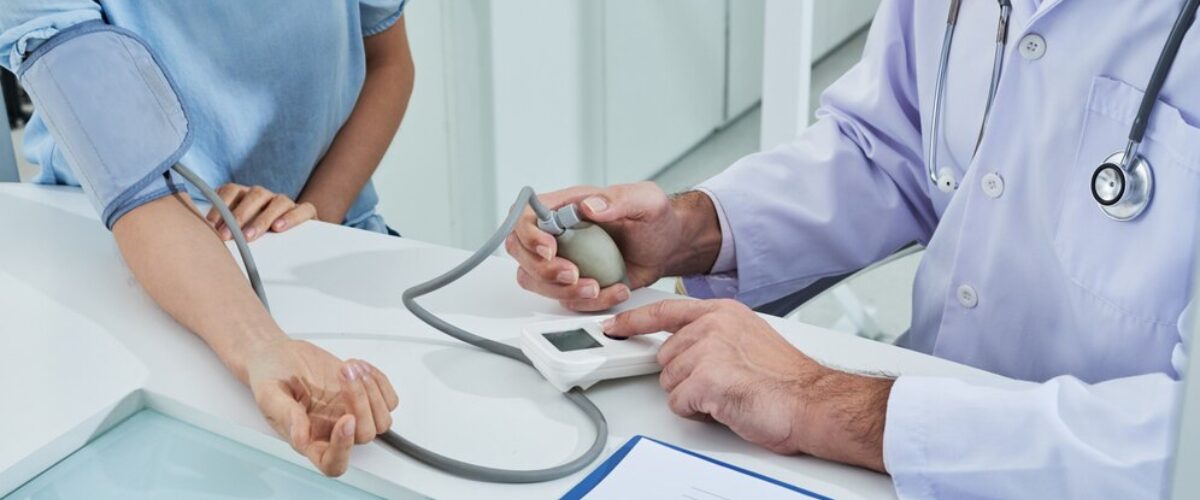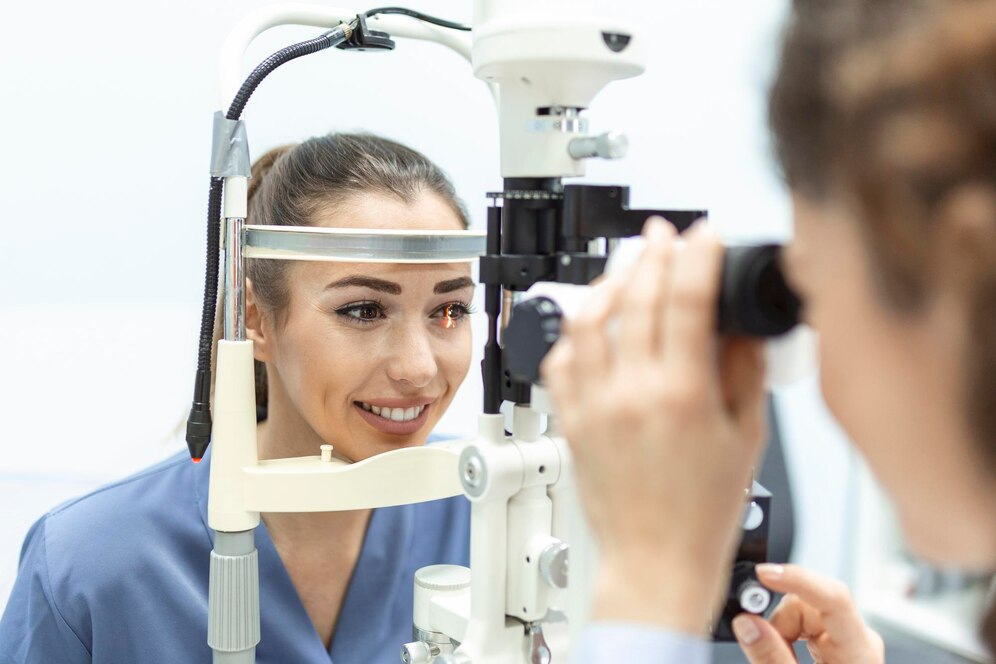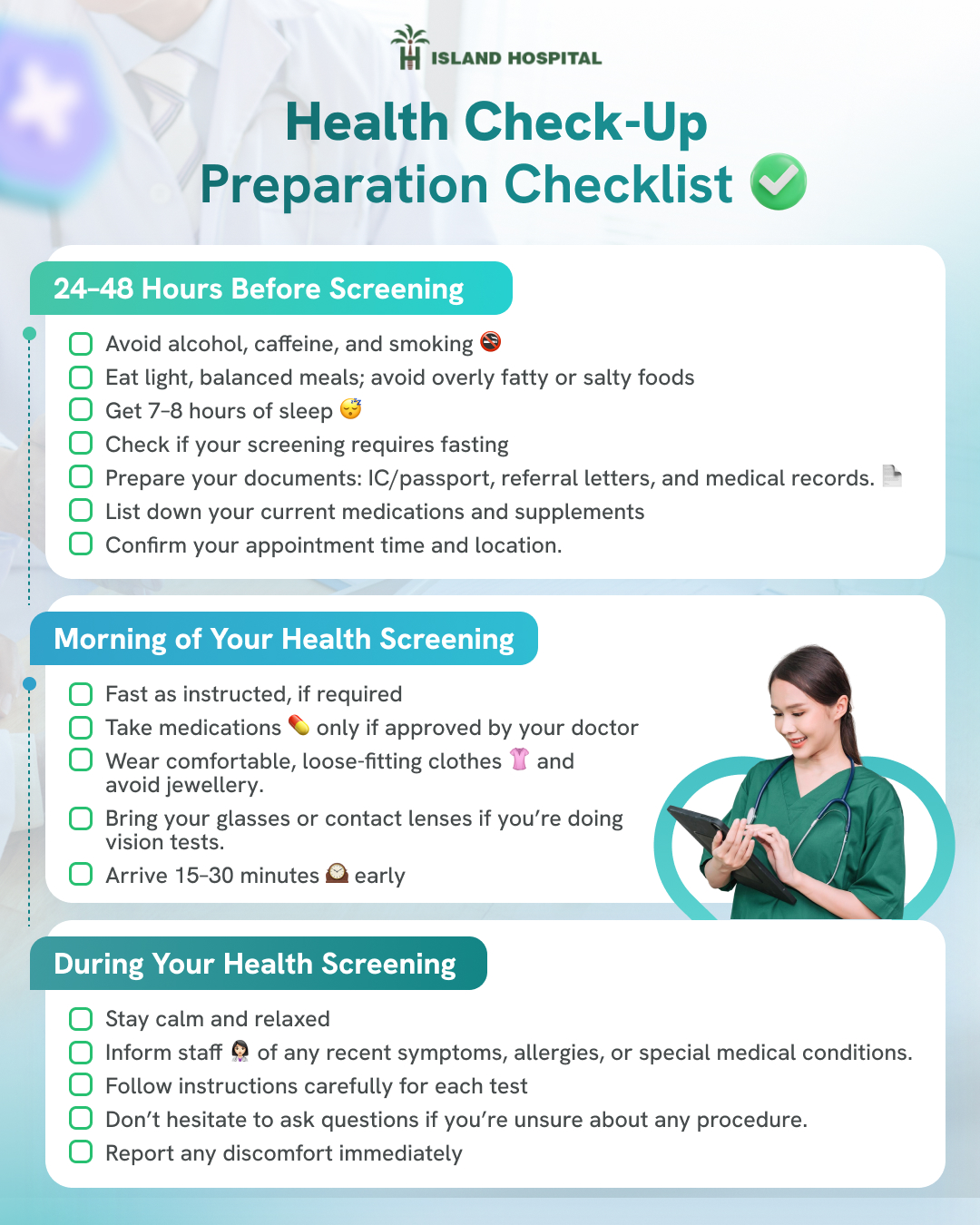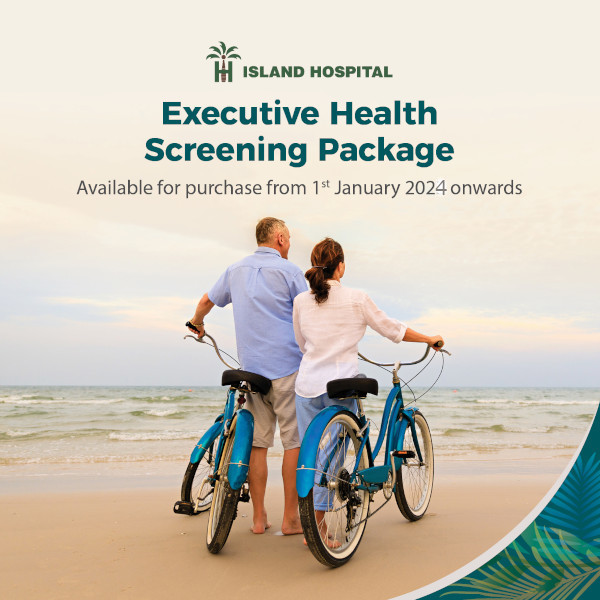
20 Jun How to Prepare for Health Screening: A Complete Step-by-Step Guide
How to Prepare for Health Screening: A Complete Step-by-Step Guide
By Island Hospital | June 20, 2025 10:30:00 AM
If you’ve been thinking you’re healthy, then think again. It’s easy to brush off a fever, headache, or fatigue as “nothing serious.” But how sure are you that you’re truly in good health?
In Malaysia, many people assume they’re fine as long as nothing feels wrong, often attributing symptoms to stress or lifestyle habits. But feeling well doesn’t always mean your body is in good health.
But here’s the truth: you don’t need a diagnosis for prevention to matter. In fact, some of the most serious conditions — like high blood pressure, diabetes, and high cholesterol — develop quietly, showing no clear signs until the damage is already done.
According to the National Health and Morbidity Survey (NHMS) 2023, many Malaysians are unknowingly living with undiagnosed or untreated non-communicable diseases, often without any noticeable symptoms.
That’s why regular health screenings are essential. A screening isn’t just a checklist of tests — it’s your chance to understand what’s going on inside your body and detect potential issues early, while they’re still manageable or even reversible.
Types of Health Screening Tests You Should Know About
Early detection is key to preventing serious health issues, and that starts with the right screening tests.
It involves a series of tests that can detect potential health issues before any symptoms appear. With regular screening, you gain early insights that support informed lifestyle changes or timely medical treatment.
Of course, there’s no one-size-fits-all solution. Fortunately, in Malaysia, there’s a wide range of health check-up packages available, each tailored to detect specific conditions based on factors such as age, gender, and personal health risks.
1. Eye screening

Eye health is often overlooked — yet the eyes can reveal far more than just vision problems. Many eye conditions develop silently, without noticeable symptoms in their early stages.
A comprehensive eye screening goes beyond checking your vision clarity. It includes a range of tests to assess the health of your retina, optic nerve, and eye pressure.
Eye screenings can detect.
- Common vision problems include myopia (short-sightedness), hyperopia (long-sightedness), astigmatism, and presbyopia.
- Age-related conditions such as cataracts, glaucoma, and macular degeneration.
- Systemic health issues, including early signs of diabetes, hypertension, and even brain or nerve conditions.
Eye exams are especially important for:
- Adults over 40.
- Individuals with a family history of eye diseases or diabetes.
- Children.
- Individuals who experience frequent screen time, headaches, or vision changes.
With regular screening, these silent threats can be identified and addressed early, helping to preserve your vision and protect your overall health.
2. Cancer Screening

Cancer is a major health concern and remains one of the leading causes of death worldwide, with an estimated 10 million deaths being recorded in 2020 alone.
Often referred to as a silent killer, cancer can develop gradually and, in many cases, without any noticeable symptoms until it reaches an advanced stage. This makes early detection all the more critical.
The good news is that many types of cancer are treatable — and in some cases, even curable — when caught early. That’s what makes cancer screening so important.
By detecting cancer or pre-cancerous changes before symptoms appear, screening enables earlier intervention and significantly improves treatment outcomes and survival rates.
Different cancers require different screening methods, which are usually recommended based on your age, gender, personal risk factors, and family history.
Cancer screenings can detect:
- Breast cancer
- Cervical cancer
- Prostate cancer
- Lung cancer
- Liver cancer
These screenings are particularly important for:
- Adults over the age of 40.
- Individuals with a family history of cancer.
- Individuals with known genetic risks (e.g. BRCA mutation, Lynch syndrome)
- People with lifestyle-related risk factors (e.g. smoking, alcohol, obesity, poor diet)
Looking for a more advanced, proactive approach to early cancer detection?
Island Hospital’s Multi-Cancer Early Detection Test screens for over 50 types of cancer through a single blood test — even before symptoms appear. Speak to our team of experts and book an appointment today!
3. Cardiac Screening

You might think you’d know if something was wrong with your heart, but that’s not always the case. Heart disease can progress quietly for years, without obvious symptoms, until it suddenly becomes life-threatening.
Taking care of your heart health involves understanding your risk factors and undergoing appropriate cardiac screenings. Cardiac screening is designed to detect heart conditions early, even before symptoms appear.
Cardiac screenings can detect:
- Coronary artery disease
- Irregular heart rhythms (arrhythmias such as atrial fibrillation)
- High blood pressure and its effects on heart structure and function.
- Heart muscle abnormalities
- Valve disorders, such as stenosis or regurgitation
- Early signs of heart failure or reduced heart pumping capacity.
- Past silent heart attacks that went unnoticed.
- Congenital heart defects or structural abnormalities.
These screenings are particularly important for:
- Adults aged 40 and above.
- Individuals with a family history of heart disease or stroke.
- Those with high blood pressure, high cholesterol, or diabetes.
- Smokers or former smokers.
- People with a sedentary lifestyle or high-stress levels.
- Individuals experiencing chest pain, shortness of breath, or palpitations.
- Patients with obesity or a high body mass index (BMI).
- Individuals with existing conditions such as kidney disease or metabolic syndrome.
Your heart won’t always give you a warning — stay ahead with early screening.
Island Hospital’s Comprehensive Cardiac Arrhythmia Screening is designed to detect early signs of heart disease, irregular rhythms, and structural abnormalities through advanced, non-invasive tests.
Schedule your screening now and let our specialists help you understand your heart better.
4. General Screening
General health screening is your first line of defence when it comes to understanding your overall health status. It’s designed for individuals who may not have specific symptoms but want a broad health overview to catch any hidden issues early.
General screenings can detect:
- High blood pressure
- Elevated blood sugar levels
- High cholesterol levels
- Liver and kidney function abnormalities
- Thyroid dysfunction, including underactive or overactive thyroid conditions.
- Urinary abnormalities, such as protein or blood in the urine
- Nutritional deficiencies, such as anaemia or low vitamin D levels.
- Signs of infections or inflammation
This all-in-one screening is ideal for:
- Adults over 30
- Individuals with a family history of chronic illness
- Those who haven’t had a medical check-up in over a year
- Employees undergoing annual wellness assessments
Looking for a health screening to assess your overall well-being?
Island Hospital’s Executive Health Screening Package offers a comprehensive, all-in-one check-up designed to detect hidden health risks early.
Book your screening today and take charge of your health with clarity and confidence.
5. Women’s Health Screening
Women have unique health needs that change with age, from reproductive health and hormonal balance to bone density and cancer risk. That’s why women’s health screening goes beyond general check-ups, offering targeted tests to focus on early detection of conditions that disproportionately or exclusively affect women.
These screenings can detect:
- Breast conditions, including lumps, cysts, and early signs of breast cancer
- Cervical abnormalities or HPV-related changes
- Hormonal imbalances that affect menstruation, fertility, or menopause
- Thyroid dysfunction
- Bone health issues like osteopenia or osteoporosis
- Reproductive organ conditions, such as ovarian cysts or uterine fibroids
These screenings are particularly important for:
- Women aged 21 and above
- Women with a family history of breast, ovarian, or cervical cancer
- Individuals experiencing irregular periods, early menopause, or fertility concerns
- Women with lifestyle risk factors (e.g., smoking, poor diet, hormonal therapy)
Prioritise Your Health at Every Stage of Life
Island Hospital’s Comprehensive Screening Package for Women is tailored to meet women’s unique health needs. Book your screening today and take the first step toward lifelong wellness.
6. Health Screening for Men
Staying healthy isn’t just about hitting the gym or eating right — it’s also about knowing what’s going on inside your body. Men often focus on performance and productivity but overlook silent health risks that build over time.
Health screening provides a data-driven look at your current condition, helping you make informed decisions for a stronger, longer life.
These screenings can detect:
- Prostate disorders, including benign enlargement or early-stage prostate cancer
- Hormonal imbalances, such as low testosterone
- Heart disease risk factors, including high cholesterol and hypertension
- Elevated blood sugar levels
- Liver and kidney dysfunction
- Urinary tract issues or infections
- Nutritional deficiencies (e.g., anaemia or vitamin D deficiency)
- Metabolic syndrome
These screenings are particularly important for:
- Men aged 40 and above
- Men with a family history of prostate cancer or heart disease
- Individuals with lifestyle risk factors (e.g., smoking, poor diet, lack of exercise)
- Men experiencing symptoms like frequent urination, fatigue, or low libido
- Those with high-stress jobs or sedentary routines
Real Strength Starts With Self-Care
Island Hospital’s Comprehensive Screening Package for Men is built to uncover silent risks early. Book your screening now and get ahead — not just in life but in health.
7. Child and Adolescent Screening

Growing bodies and developing minds require more than just daily care — they need regular health assessments to ensure every stage of development is on track. Child and adolescent screening focuses on early detection of physical, behavioural, and developmental issues that may otherwise go unnoticed.
These screenings are designed to monitor overall health, catch problems early, and guide interventions that support healthy growth through childhood, puberty, and adolescence.
These screenings can detect:
- Growth or nutritional concerns (underweight, obesity, anaemia, vitamin deficiencies)
- Vision or hearing problems
- Developmental delays in speech, motor skills, or cognition
- Behavioural or emotional health concerns, such as ADHD or anxiety
- Early signs of scoliosis, asthma, or allergies
- Dental issues, such as cavities or misaligned teeth
- Risk factors for chronic conditions like diabetes or high cholesterol
These screenings are particularly important for:
- Infants and toddlers
- Children
- Pre-teens and adolescents going through puberty
- Children with a family history of hereditary conditions or chronic illness
- Teens preparing for higher education or sports participation (e.g., pre-university screenings)
Healthy Development Starts with Regular Screening
Island Hospital offers dedicated screening packages for children and adolescents, including Children’s Dental Screening to catch oral health issues early, and the Pre-University Students Health Screening to ensure your teen is fit, focused, and ready for the next chapter.
Book today for a screening and invest in a stronger future.
Hope to expand your knowledge on Island Hospital’s health screening? This article on Everything You Need to Know About Island Hospital’s Health Screening Services has all the details you need!
Do’s and Don’ts During Your Health Screening Check-Up
Getting ready for a health screening? It’s not just about showing up — what you do before and during your check-up can have a real impact on your test results.
From adjusting your diet to choosing the right attire and staying calm on the day, a few simple preparations can make your screening smoother, more accurate, and more meaningful.
Before a Health Screening Check-Up
-
Do’s
-
-
Fast for at least 4 hours
This ensures accurate readings for blood sugar, cholesterol, and other fasting-related tests.
-
Drink plenty of plain water.

Staying hydrated makes blood draws and urine tests easier and more accurate.
-
Take your regular medications (unless told otherwise).
Some medications may be necessary to continue; check with your doctor beforehand.
-
Get a good night’s sleep.

Lack of rest can affect your blood pressure and stress levels during screening.
-
Wear loose, comfortable clothing.
You may need to change or expose certain areas for scans, like ECG or X-rays.
-
Bring relevant documents and records.
IC/passport, medical records, and current prescriptions help doctors understand your health history.
-
Arrive 15–30 minutes early.
This gives you enough time to register and settle down before your appointment.
-
-
-
Don’ts
-
-
Don’t eat or drink anything besides water during fasting.
Even coffee, milk, or chewing gum can alter blood test results.
-
Don’t smoke or drink alcohol 24 hours before.
These can interfere with liver function tests, blood pressure, and heart rate.
-
Don’t exercise right before your screening.
Strenuous activity can affect your blood pressure, heart rate, and some lab results.
-
Don’t wear jewellery, makeup, or tight clothes.
These may interfere with imaging tests or ECG stickers.
-
Don’t skip any part of the screening unless advised.
Each test provides key insights — skipping them may limit your overall health assessment.
-
-
During a Health Screening Check-Up
-
Do’s
-
-
Follow instructions from the medical staff closely.
They will guide you through each test to ensure accurate results.
-
Stay calm and relaxed.
Anxiety can raise your blood pressure and heart rate, affecting certain readings
-
Communicate openly with your doctor.
Inform them of symptoms, medical history, or if you’re feeling unwell.
-
Ask questions if you’re unsure.
Understanding each test helps you stay informed and confident about your health.
-
Cooperate fully during physical exams or scans.
Proper positioning and stillness are important for accurate imaging and assessments.
-
-
-
Don’ts
-
-
Don’t withhold medical information.
Even if it feels unrelated, it could be important for a proper diagnosis
-
Don’t consume food or drinks unless permitted.
Eating during your check-up may affect ongoing test results, especially for blood or urine tests.
-
Don’t use your phone in restricted areas.
It may interfere with medical equipment or disturb other patients.
-
Don’t leave early before completing all tests.
Each component of your screening provides a piece of the overall health picture.
-
Don’t ignore discomfort during tests.
Let staff know immediately if you feel dizzy, nauseous, or uncomfortable at any point.
-
-
Health Check-Up Preparation Checklist
First time going for a health screening? Not sure what to expect? Use this simple countdown checklist to help you feel prepared and confident. Whether you’re attending as part of a company wellness programme or booking on your own, these steps will ensure accurate results and a smooth experience from start to finish.
24- 48 Hours Before Screening
- Avoid alcohol, caffeine, and smoking
- Eat light, balanced meals, avoid overly fatty or salty foods
- Get 7 – 8 hours of sleep
- Check if your screening requires fasting
- Prepare your documents: IC/passport, referral letters, and medical records.
- List down your current medications and supplements
- Confirm your appointment time and location.
Morning of Your Health Screening
- Fast as instructed, if required
- Take medications only if approved by your doctor
- Wear comfortable, loose-fitting clothes and avoid jewellery.
- Bring your glasses or contact lenses if you’re doing vision test.
- Arrive 15-30 minutes early
During Your Health Screening
- Stay calm and relaxed
- Inform staff of any recent symptoms, allergies, or special medical conditions.
- Follow instructions carefully for each test.
- Don’t hesitate to ask questions if you’re unsure about any procedure.
- Report any discomfort immediately

What to Do After a Health Screening Session?
You have already completed your health screening, now what? Seeking your next steps depends on your health screening results. Whether your results come back all clear or flag a potential concern, taking the right follow-up actions ensures you stay on top of your health.
-
If No Major Issues are Found:
-
-
Maintain or improve your lifestyle.
Keep up with a balanced diet, regular exercise, and stress management — or make small changes to improve further.
-
Keep a copy of your results.
Keep your screening report safely, especially if you undergo health check-ups annually. It helps track patterns or early signs over time.
-
Review borderline or “slightly abnormal” results.
Even if a condition isn’t diagnosed, take note of any readings that are slightly high or low — they may need lifestyle adjustments or closer monitoring.
-
Stay consistent with routine screenings.
Even if everything looks fine now, regular check-ups are essential for early detection later on.
-
Use this as motivation
A clean bill of health is a great reminder to stay proactive — prevention is always better than a cure.
-
Follow up on optional recommendations.
Sometimes doctors suggest additional tests or lifestyle tweaks even if results are normal. These are worth considering for long-term health benefits.
-
Book your next screening in advance.
Set a reminder for your next annual or biannual screening to ensure continuous health tracking.
-
-
-
If Something Is Detected:
-
-
Schedule a follow-up consultation
If any abnormalities or warning signs are found, speak to a doctor promptly to review the results in detail and explore next steps.
-
Seek a second opinion if needed.
If the diagnosis is unclear or serious, consulting another healthcare provider can give you added clarity and confidence in making informed decisions
-
Don’t delay further testing or treatment.
Further diagnostics may be required to confirm a diagnosis or understand the severity of the condition — don’t delay.
-
Make necessary lifestyle changes.
If your screening identified risk factors like high cholesterol and elevated blood pressure, take steps to modify your diet, activity level, and habits.
-
Follow treatment or medication plans closely.
If medication is prescribed, stick to the routine and attend follow-ups as instructed to monitor progress.
-
Ask questions and stay informed.
Understand what was found, why it matters, and what your options are. Knowledge leads to better choices.
-
-
Your Health Journey Starts with a Simple Screening!

Taking care of your health doesn’t have to be complicated. With Island Hospital’s comprehensive health screening packages, you can take proactive steps toward early detection, peace of mind, and long-term well-being.
Not sure which package is right for you?
We’re offering our comprehensive Executive Health Screening Package at only RM760 – giving you a complete head-to-toe health assessment for peace of mind.
Our package features vital health screenings, including Cardiovascular Assessment, Full Blood Picture, Radiological Screening, Diabetes Screening, Kidney Function Test, and much more.
What’s Included in Your Screening Experience
✔ Physical examination
✔ Complete medical report
✔ Consultation by Health Screening Physician/Specialist
✔ Choice of light refreshments
✔ Exclusive Island Hospital woven bag
FAQ
Why do people say some health screenings are not necessary?
Not all health screenings are needed for everyone. Some tests may be unnecessary if you’re at low risk, have no symptoms, or if the test is not backed by strong medical guidelines.
In some cases, screenings can lead to false positives or overdiagnosis, detecting harmless conditions that may cause unnecessary stress or treatment. That’s why screenings should be personalised based on your age, gender, lifestyle, and medical history. Always consult a healthcare provider to decide which tests are right for you.
What to do if I or someone I know is afraid of health screening tests?
It’s completely normal to feel nervous or anxious about health screenings, especially if it’s your first time or you’re worried about the results. Start by understanding that screenings are meant to protect your health, not scare you. Talk to your doctor about what to expect — knowing the process often helps reduce fear.
Bring a friend or loved one for support, and try to schedule screenings early in the day to avoid prolonged stress. If fear is linked to pain (like blood draws), let the staff know — they’re trained to make you feel as comfortable as possible.
At what age should I go to a health screening?
Most adults should begin regular health screenings by the age of 30, even if they feel healthy. However, certain tests may start earlier or later depending on your gender, family history, and lifestyle.
For example, cholesterol and blood pressure checks can begin in your 20s, while cancer screenings (like for the colon or breast) typically start around 40 to 50. It’s best to consult your doctor to personalise your screening schedule based on your risk factors.
How often should I do health screenings?
In general, adults should undergo a full health screening once a year, especially if they’re over 30 or have risk factors like high blood pressure, diabetes, or a family history of illness.
However, some tests like cholesterol or blood sugar may only be needed every 1–3 years if results are normal and you’re low risk. The frequency depends on your age, gender, lifestyle, and medical history, so it’s best to follow a schedule recommended by your doctor.
Is health screening safe for children?
Yes, health screening is completely safe for children. The tests used are non-invasive or minimally invasive and are carefully selected based on the child’s age and health needs.
Screenings like growth assessments, vision checks, hearing tests, and even dental evaluations are painless and designed to ensure your child’s development is on track. If any blood or imaging tests are needed, they’re performed under professional supervision with your child’s comfort and safety as the top priority.










